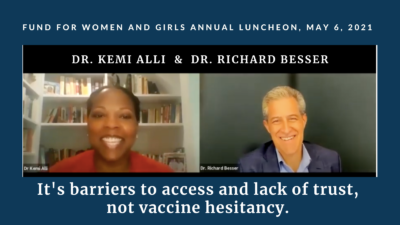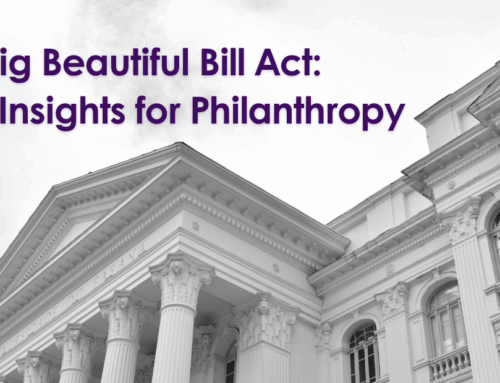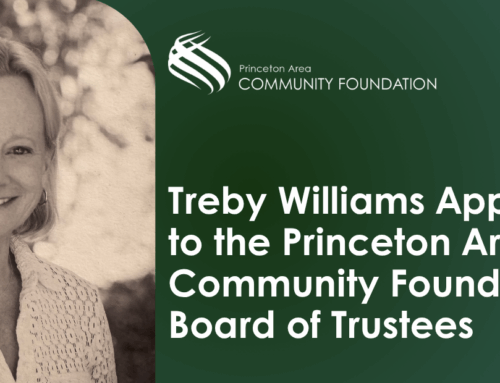
Dr. Richard Besser and Dr. Kemi Alli challenged members of the Fund for Women and Girls to think outside the box to understand the vaccine needs of communities hit hard by the COVID pandemic. In a Zoom discussion at the Fund’s annual luncheon on May 6th, they focused on barriers to access and a lack of trust to explain concerns about COVID-19 vaccines in these communities.
Dr. Besser, President and CEO of the Robert Wood Johnson Foundation in Princeton, believes structural barriers, such as the location of vaccination centers and the times they are open, not numbers of vaccines given per day, reveal a lack of equitable access. Workers in low-income jobs often must choose between a paycheck and a vaccine because they cannot take time off from work and wait in line for a vaccine. “That is not a fair choice,” said Dr. Besser. “We need to set up vaccine centers in places where there is a high level of trust.” Many communities prefer trusted venues in their neighborhoods, such as places of worship, not “mega sites” in outlying locations with few transportation options.
Such structural and systemic barriers explain low vaccination rates in black and brown communities. Dr. Alli, CEO of the Henry J. Austin Health Center in Trenton, explained, “On average, one in five individuals in the City of Trenton have been fully vaccinated.” That low rate is a consequence of systems and practices that have held back individuals in communities that have been underserved for generations. “The healthcare industry as a whole really needs to rethink the systems and practices we have in place that have disenfranchised individuals for so long,” she said. Vaccines get in the arms of people when delivered to where people actually live, work, and play.
Dr. Besser noted that it will be a long time before we understand the impact of the pandemic on communities that face discrimination. Reflecting on the heavy loss of black and brown lives from COVID, he added “When you talk about losing so many Latino men, they are parts of families. That is children losing a father.” These men are fathers, brothers, and husbands whose loss has a profound impact on the economic security of a family.
The doctors do see opportunities embedded in the tragedy of the pandemic. Dr. Besser and Dr. Alli discussed the rise of telemedicine as one positive outcome. Because most people have cell phones, underserved communities have increasing access to mental health services. This is one example of how reducing barriers allows access to the system.
They urged the audience to support new ideas in philanthropy that promote access and equity for communities particularly hard hit by the pandemic. Dr. Besser presented research and initiatives funded by the Robert Wood Foundation that analyze access to healthcare, education, and job opportunities to create community driven policies. Programs such as the Well Babies Well Moms initiative supported by the Henry J. Austin Health Center, supported by the Fund for Women and Girls, underline the crucial impact of data to build a culture of health that highlights equity.
About the Fund for Women and Girls
The Fund for Women and Girls, a field-of-interest fund of the Princeton Area Community Foundation founded in 1998, is a diverse group of community members who together invest in nonprofit organizations that improve the lives of economically vulnerable women and children in greater Mercer County. The Fund has granted over $1,000,000 to nonprofits serving women and children in Central New Jersey and Bucks County. For more information, www.pacf.org/fwg.





